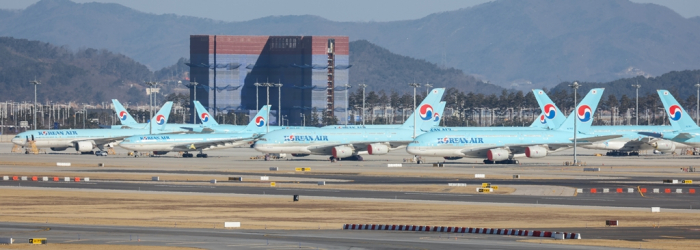
Korean Air aircraft stationed at Incheon International Airport, South Korea Korean Air Lines Co. ’s stock underperformed those of its US rivals on concerns that South Korea’s top carrier is unlikely to immediately benefit from the economic reopening. The flagship airline will also be bruised by a weaker won currency and surging fuel costs.US airlines’ shares jumped on Wednesday after Delta Air Line Inc.’s quarterly earnings beat market expectations with its sales during the January-March period at $9.4 billion, higher than a forecast of $8.9 billion. The US third-largest airline also expected to turn to the black in the current quarter on robust consumer demand.Delta’s stock jumped 6.21%, extending its gains to 36.23% compares with its lows last month. American Airlines Inc. and Southwest Airlines Co. also soared 10.62% and 7.54%, respectively, on the day.On the other hand, Korean Air rose 0.8% to end at 31,550 won ($25.7) in South Korea’s main stock market on Thursday, up some 16% from its lows in March.NEED TO CONSULT WITH 170 COUNTRIESThat came as US airlines generate much of their sales from domestic flights, while Korean Air heavily relies on international flights.As of 2019, sales of US airlines’ domestic flights accounted for about 60% of their total revenues on average. They can increase sales unless the authorities impose regulations on movement within the country. But Korean Air’s domestic flights made up only 4% of its total sales.“In order for international passenger flights to recover to the pre-COVID-19 levels, it needs to consult with about 170 countries that are restricting entries of Koreans,” said Kim Young-ho, an analyst at Samsung Securities Co. “It could take more time than expected to see a recovery in international passenger flight demand.”South Korean airlines’ stocks have been supported since last year by hopes for recovery with countries worldwide opening up their borders.A combined market capitalization of South Korea’s five carriers excluding Asiana Airlines that decided capital reduction in 2020 more than tripled to 13.3 trillion won from 4.4 trillion won in 2019.“It is hard to explain the increase only with hopes for the improvement in their earnings based on the potential international passenger flight recovery,” Kim said.CURRENCY, FUELSurging fuel prices and a softer won are also expected to hurt its earnings, analysts said. Meritz Securities predicted Korean Air’s earnings before interest, taxes, depreciation, and amortization (EBITDA) on a separate basis to fall 36.2% this year while forecast its operating profit forecast may tumble 75%.Investors, however, continued to hope for an eventual recovery in international passenger flights.“The recovery of international passenger flight demand for Korean Air will be slower than that for US carriers, but the trend of rising demand is not different,” said Jung Yeon-seung, an analyst at NH Investment & Securities. “So, (Korean Air’s) share prices will follow the demand.”By Sung-Mi Shimmshim@hankyung.comJongwoo Cheon edited this article.
Most Read